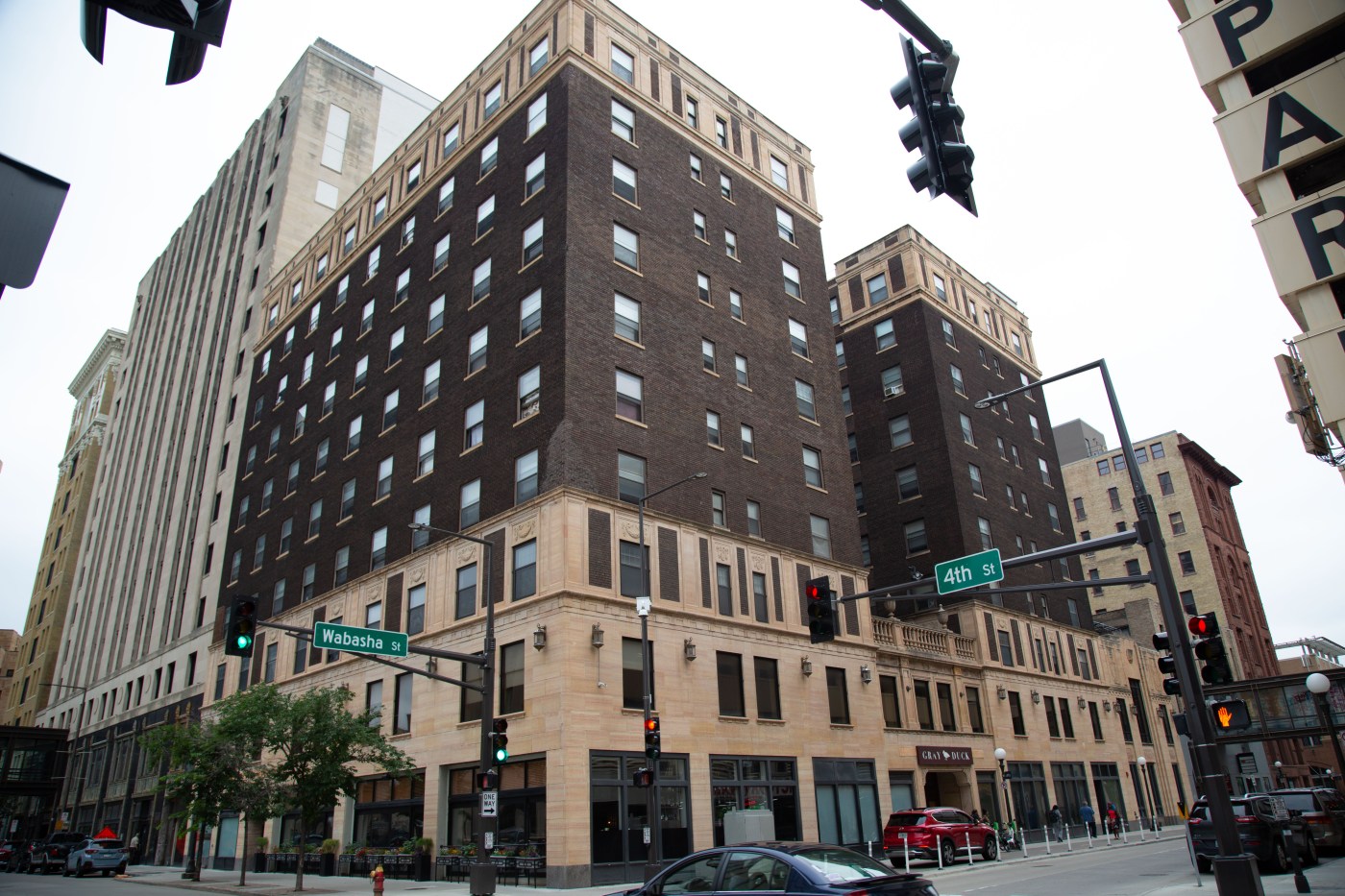
Lowry Apartments in downtown St. Paul are in foreclosure. Tenants say they weren’t told about it.
The foreclosure notice ran in early July in the pages of the St. Paul Legal Ledger, not the typical nightly reading material for most tenants of downtown St. Paul’s Lowry Apartments. The legal ad indicated that their 11-story apartment building would be sold at a sheriff’s auction on Aug. 22, leaving the ownership of all 134 housing units in the hands of the highest bidder.
Tenants of the visibly dilapidated building — which once housed a storied downtown hotel and disco club — say they’ve received no written notice of foreclosure, even though notice is required by state statute. News of the pending sheriff’s sale was carried Aug. 9 by the Minneapolis-St. Paul Business Journal but has only just begun to circulate among lease-holders.
“I have not received any such notice and I have not heard of anyone getting one and the foreclosure auction is now seven days away,” said longtime tenant Megan Thomas, who organized a speak-out for Lowry tenants at a Wabasha Street eatery on Wednesday evening.
State Rep. Maria Isa Perez-Vega, DFL-St. Paul, and Deputy Mayor Jaime Tincher were among some 50 attendees.
“Who is here fearing that if a foreclosure happens, you’re going to be homeless?” Perez-Vega asked the crowd.
A flurry of hands went up. Tincher later distributed printed materials to attendees explaining their rights during the foreclosure process.
Patricia Moreno, who has lived at the Lowry since 1985, recalled better days in decades past when the refashioned hotel hosted a night club. “It was very nice,” said Moreno, pantomiming dancing. “There was a disco in the basement!”
Moreno said she witnessed a house cleaner — a fellow Spanish-speaker — being let go on Wednesday by a property manager. “They told her this was her last week,” Moreno said. “She didn’t want to cry in front of him.”
Property listed in May
The Minneapolis office of Marcus & Millichap listed the property at 345 Wabasha St., which is owned by Madison Equities, for sale on the traditional market as an individual structure in May, just days after Madison Equities put 10 commercial buildings spanning some 1.6 million square feet of real estate on the market together through brokerage CBRE. Like the Lowry, most of that commercial real estate — a collection of office buildings and parking ramps, some hosting active restaurants — is located in downtown St. Paul.
In July, a broker for Marcus & Millichap reported receiving eight bids for the Lowry property, which were under review. It’s unclear how prospective buyers might acquire the property through an open sale as the sheriff’s auction gets underway next week.
Efforts to reach representatives of Madison Equities for comment were unsuccessful on Wednesday.
Abe Roberts, a broker with Marcus & Millichap, indicated in an email Wednesday that they would have “no comment at this time.”
State law requires tenant notice
State law requires that residential tenants be sent printed notice of foreclosure written in 14-point boldface type, on colored paper, under an even larger title indicating “Foreclosure: Advice to Tenants,” though no such notice appears posted anywhere inside the Lowry. Tenants say they’ve received no communication by mail or email.
The state statute requires that the notice spell out their rights and responsibilities during the foreclosure process, as well as the rights and responsibilities of their landlord. Among those requirements, they’re to keep paying rent and abiding by the terms of their lease, and the landlord is to keep the property maintained. Even after a sheriff’s sale, the former property owner has time — generally six months — to pay off the mortgage and reacquire the property.
Thomas has taken her concerns about the lack of upkeep at the Lowry to court. She’s kept paying rent through an escrow account, through which the courts designate a third party to hold her payment for her and will determine when to release the funds to the property owner. Juan Luis Rivera-Reyes, a tenants rights organizer, distributed forms that would allow others who live there to place their rent in escrow until repair concerns are met.
The original principal of the Feb. 8, 2016, mortgage was $17 million, owed by the Lowry Building LLC, a subsidiary of Madison Equities, to Colliers Funding LLC, according to the notice in the St. Paul Legal Ledger. The building’s estimated market value is $8.6 million, according to Ramsey County property records.
Jim Crockarell, the principal behind Madison Equities, died in January, leaving his large portfolio of downtown St. Paul properties to his wife, Rosemary Kortgard. She’s since put most of those properties on the market and closed the Gray Duck Tavern, the ground-level restaurant and bar situated within the Lowry building and across the street from St. Paul City Hall.
Related Articles
Minnesota Yacht Club Festival will return in 2025 with an added third day of music
St. Paul mayor proposes major changes to rent control, 8% tax levy increase
Charlotte Johnson retires from helm of Otto Bremer Trust; daughter to replace her
St. Paul: Church of the Assumption abandons fight against new affordable housing at Mary Hall
FlixBus launches at downtown St. Paul Union Depot

